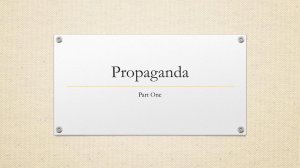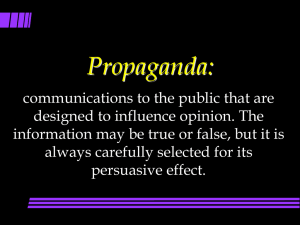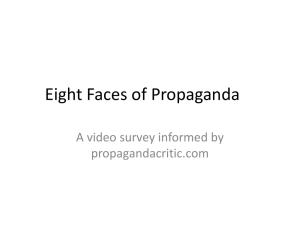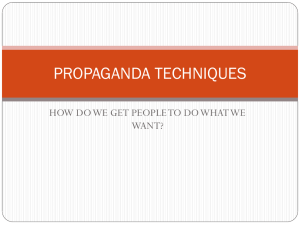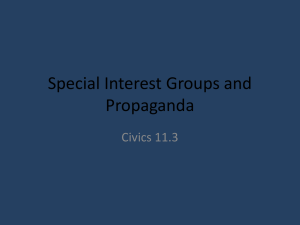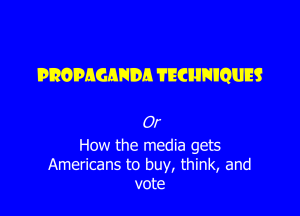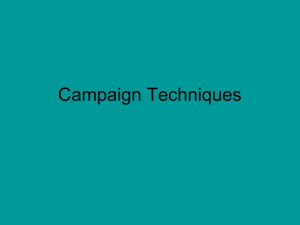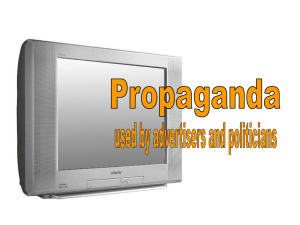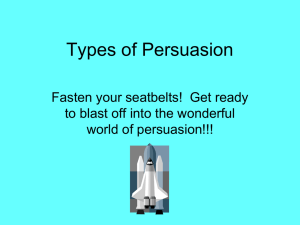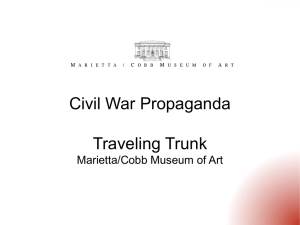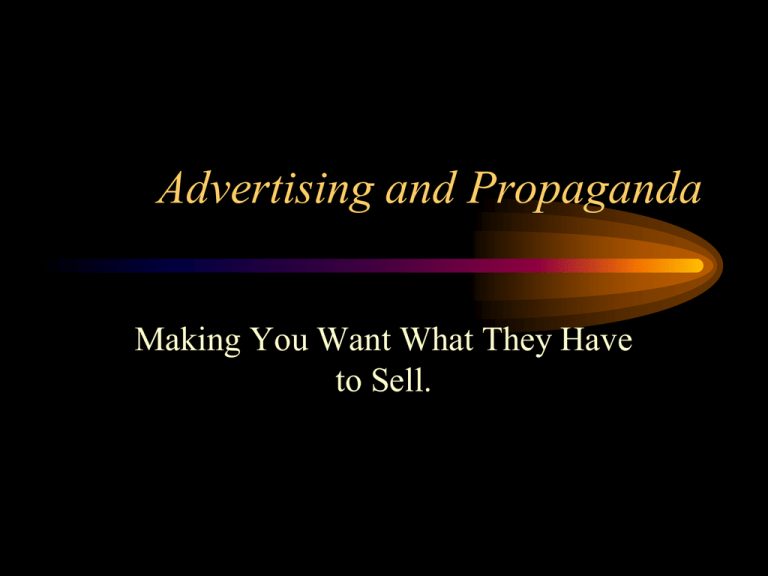
Advertising and Propaganda
Making You Want What They Have
to Sell.
What Is Propaganda?
Propaganda (n.) is the spreading of ideas,
information, or rumor for the purpose of helping
or injuring a cause.
Therefore, propaganda may or may not be negative. However,
its intent is ALWAYS to convince. The sole purpose of
propaganda is to sell you something, be that an idea, a
product, or a service.
10 Major Propaganda Techniques
•
•
•
•
•
Bandwagon
Testimonial
Transfer
Repetition
Compare/Contrast
(Card Stacking)
• Glittering
Generalities
• Name Calling
• Exigency
• Plain Folk
• Emotional
Bandwagon
• Everyone is doing it.
• Be a part of the crowd.
• Don’t get left out.
Bandwagon
Propaganda,
including
bandwagoning,
is used all over
the world, as
in this ad from
Thailand for
Fanta
Blueberry.
Bandwagon
Come on,
don’t you
want to
belong?
In this milk ad, the
cast of Everybody
Loves Raymond is
using
Bandwagoning -Robert isn’t
drinking milk and
he is sad because
he doesn’t fit in.
Testimonial
• A famous person endorses a product.
• May also use some who isn’t famous, but who
claims to have used the product successfully to
obtain their goals.
• The “got milk?” ad on the previous page is also an
example of a testimonial.
Testimonial
Jeff Gordon, one of the best
known Nascar drivers of today, is
endorsing milk.
What other products can you
think of that have famous
spokespeople?
Testimonial
Testimonial
Other products, especially diet aids, exercise
equipment, and beauty products use people who are
not famous, but who claim to have successfully used
their product to improve their lives. This is another
form of the Testimonial approach.
Transfer
• Using words that will get your feelings
about one thing transferred to another thing.
– Usually deals with patriotism, but may also
include. . .
– Sex Appeal
– Love or Popularity
– Power and Fame
– Money and Wealth
Transfer
This is an example of Transfer. What two types of
transfer are they using?
Patriotism and Love.
Transfer
• Winston Cigarettes are
using what 2 types of
Transfer in this ad?
– Patriotism
– Power
Repetition/Slogan
• Repeating a key word or phrase in hopes
that it will be remembered.
• A logo might also be used repeatedly.
They’re always
after me Lucky
Charms!
Repetition/Slogan
• Target is using
repetition of their
logo in this ad.
• What two other
propaganda
techniques are they
employing?
Compare/Contrast – Snob Appeal
(Card Stacking)
• Comparing two similar products with one always superior.
• Stacking all of the “cards” in favor of one of the products over
another.
• Frequently used in political advertising.
• Appealing to upscale dreams or aspirations; not necessarily an
expensive product, but appealing to the rich; opposite of plain
folks
Compare/Contrast
(Card Stacking)
You and your baby will love the great features on
Pampers Baby-Dry! The double-thick leg gathers
help fight leaks better than other leading regular
brand, helping to keep your baby's delicate skin
dry and healthy looking.
Card Stacking at
its best. See
how Pampers is
CLEARLY
superior to ALL
other diapers?
Glittering Generalities
• Using words that sound good, but don’t
really mean anything.
• Creates a favorable image in the mind of the
consumer.
Glittering
Generalities
Close Coverage, huh?
Wow, nice. Does it
really mean anything?
Certs, with Retsyn. That
sounds nice, but what IS
Retsyn??
Glittering Generalities
Absolute Vodka is
using a play on words.
Their glittering
generality is that this is
appealing, absolutely.
Hmmm...
Name Calling
• Uses words to give you a
negative impression of the
other person or product.
• Used a lot in political
campaigns.
• Usually goes had in hand with
Compare/Contrast. (Look
again).
Exigency
• Tries to convince you to purchase the
product IMMEDIATELY.
• Used to get you to buy first and ask
questions later.
• Often used in info-mercials.
Order Today
Exigency
Do it NOW!
Plain Folk
• Just one of the guys (or girls).
• An average Joe.
• Used to appeal to the general public by
saying that the people in the ads are the
same as you, have the same problems, and
understand you.
• Gives consumers a sense or camaraderie.
Plain Folk
The ad asks, “Not a supermodel?” This is implying that
MOST aren’t, so learn how to like what you’ve got.
Not a bad message, but still, it IS propaganda.
Plain Folk
Wow! You don’t
get much more
down-home and
folksy than a
cowboy.
The slogan says, “Come to where the flavor is.” So, in addition to Plain
Folk, what other propaganda technique are they using?
Emotional Words
Words such as luxury, beautiful, paradise, and economical are
used to evoke positive feelings in the viewer.
Review
Alright you Propaganda Experts, it’s
time to show what you know. Tell
me what propaganda techniques are
being used in the following ads.
Review
• Exigency -“Limited Edition.”
• Transfer -Patriotism. Slogan
says, “A Real
American Hero.”
Review
• Repetition -Count the Nike
symbols.
• Testimonial -Who is the man
with the shoes?
Review
• Glittering
Generalities -“It’s not just a
bath, its . . .”
• Plain Folk -- “It’s
a woman thing.”
Review
• Plain Folk -- Everyone
gets excited over a
returned call.
• Glittering Generalities
-- “Real”
• Repetition -- Although
only shown once, the
logo fills the entire ad.
• Bandwagon -- Don’t
you want to join this
crowd?
Bibliography of Cited Sources
1. “Adflip.” Adflip, LLC. 2 May 2003. <http://www.adflip.com/>
2. “Brandscape.” General Mills, Inc. 29 Apr 2003.
<http://www.GeneralMills.com/corporate/brandscape/>
3. “Pampers.com.” The Procter & Gamble Network. 29 Apr 2003.
<http://www.pg.com/frameset_fs.jhtml?frameURL=http%3A%2F%2Fwww.pampers.co
m>
4. “Trident.” Warner-Lambert Company. 28 Apr 2003.
<http://www.tridentgum.com/consumer/html/c0001.html>
5. “Weight Watchers.” Weight Watchers International, Inc. 28 Apr 2003.
<http://www.weightwatchers.com/successstories/c4_ss_doy_where.asp?dirnum=4>

